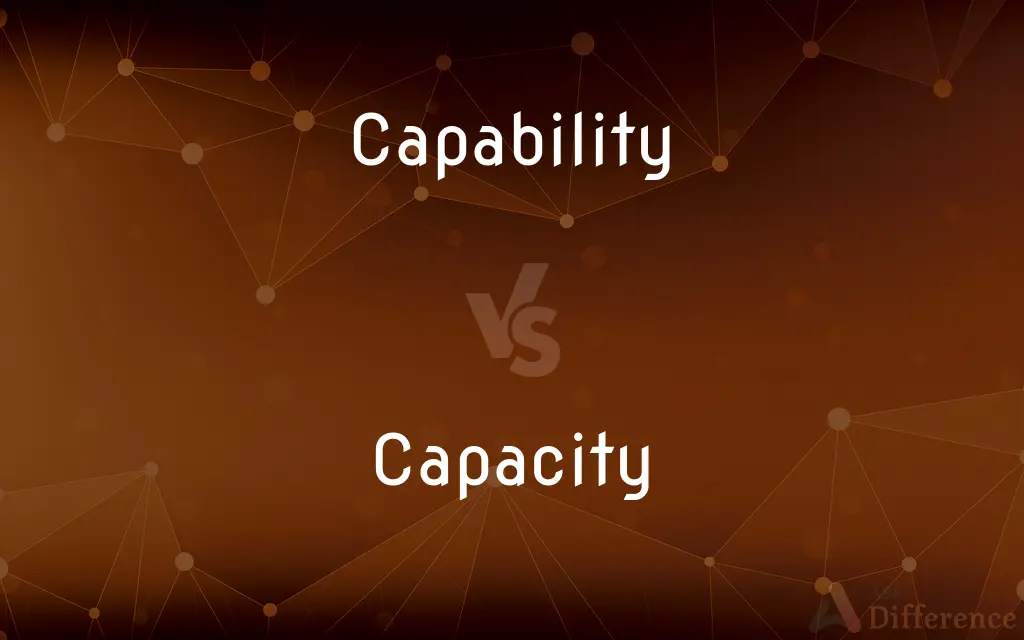Capability vs. Capacity — What's the Difference?
By Tayyaba Rehman — Updated on October 5, 2023
Capability refers to the ability or skill to do something, while Capacity denotes the maximum amount something can contain or produce.

Difference Between Capability and Capacity
Table of Contents
ADVERTISEMENT
Key Differences
Capability and Capacity are terms that, though related, serve different purposes in the English language. Capability revolves around the skills, abilities, or qualities that enable someone or something to perform a particular function. In essence, it's about potential based on skillset. On the other side, Capacity pertains to the maximum amount or number that can be contained or produced, highlighting limits or boundaries.
For instance, a person's capability might involve their competence in a certain field, like their capability to code in multiple languages. Capacity, in this context, could relate to how many hours they can work in a day without experiencing burnout. Another example would be a factory's capability to produce various products, and its capacity might refer to how many units of a particular item it can produce in a day.
While capability accentuates the proficiency or competence, Capacity zeroes in on volume or quantity. A machine's capability could be its multifunctionality, while its capacity would be the volume of products it can churn out in an hour.
In broader terms, Capability captures the qualitative aspect, gauging "how well" or "in what ways," whereas Capacity evaluates the quantitative aspect, answering "how much" or "how many."
Comparison Chart
Definition
Ability or skill to perform a task.
Maximum amount something can contain or produce.
ADVERTISEMENT
Focus
Qualitative (how well).
Quantitative (how much/many).
Application
Refers to skills, talents, or functions.
Refers to volume, quantity, or limits.
Usage
Describes proficiency or competence.
Describes boundaries or limits.
Measure
Often subjective or skill-based.
Typically objective or number-based.
Compare with Definitions
Capability
The extent of someone's or something's ability.
The army showcased its defensive capability.
Capacity
The total output or production potential.
The factory is operating at full capacity.
Capability
Skills or talents that enable functionality.
Her leadership capability is unmatched in the organization.
Capacity
Mental or emotional ability to comprehend or withstand.
The trauma was beyond his capacity to bear.
Capability
The power or ability to do something.
The company has the capability to complete the project on time.
Capacity
The ability to receive, hold, or absorb something
The storage capacity of a car's trunk.
Capability
A feature or quality that can be developed.
This software has the capability to track user data.
Capacity
The maximum amount that can be contained
A bin filled to capacity.
Capability
The power or ability to do something
The company's capability to increase productivity
He had an intuitive capability of bringing the best out in people
Capacity
The power to learn or retain knowledge; mental ability.
Capability
The quality of being capable; ability.
Capacity
The ability to do, make, or accomplish something; capability
A comedian's capacity for making people laugh.
Capability
Often capabilities A talent or ability that has potential for development or use
A student of great capabilities.
Capacity
The maximum or optimum amount that can be produced
Factories operating below capacity.
Capability
The capacity to be used, treated, or developed for a specific purpose
Nuclear capability.
Capacity
The quality of being suitable for or receptive to specified treatment
The capacity of elastic to be stretched.
Capability
The power or ability to generate an outcome
Capacity
The position in which one functions; role
In your capacity as sales manager.
Capability
(computing) A digital token allowing a user or process to interact in a specified way with an object that is subject to access control.
Capacity
Legal qualification or authority
The capacity to make an arrest.
Capability
The quality of being capable; capacity; capableness; esp. intellectual power or ability.
A capability to take a thousand views of a subject.
Capacity
(Electricity) Capacitance.
Capability
Capacity of being used or improved.
Capacity
Filling a space with the most it can hold
A capacity crowd at the concert.
Capability
The quality of being capable -- physically or intellectually or legally;
He worked to the limits of his capability
Capacity
The ability to hold, receive, or absorb
Capability
The susceptibility of something to a particular treatment;
The capability of a metal to be fused
Capacity
A measure of such ability; volume
Capability
An aptitude that may be developed
Capacity
The maximum amount that can be held
It was hauling a capacity load.
The orchestra played to a capacity crowd.
A factory operating at less than full capacity.
Capability
The potential or suitability for a particular action.
The land has the capability for agricultural use.
Capacity
Capability; the ability to perform some task
Capacity
The maximum that can be produced.
Capacity
Mental ability; the power to learn
Capacity
A faculty; the potential for growth and development
Capacity
A role; the position in which one functions
Capacity
Legal authority (to make an arrest for example)
Capacity
Electrical capacitance.
Capacity
(operations) The maximum that can be produced on a machine or in a facility or group.
Its capacity rating was 150 tons per hour, but its actual maximum capacity was 200 tons per hour.
Capacity
Filling the allotted space.
There will be a capacity crowd at Busch stadium for the sixth game.
Capacity
The power of receiving or containing; extent of room or space; passive power; - used in reference to physical things.
Had our great palace the capacityTo camp this host, we all would sup together.
The capacity of the exhausted cylinder.
Capacity
The power of receiving and holding ideas, knowledge, etc.; the comprehensiveness of the mind; the receptive faculty; capability of understanding or feeling.
Capacity is now properly limited to these [the mere passive operations of the mind]; its primary signification, which is literally room for, as well as its employment, favors this; although it can not be denied that there are examples of its usage in an active sense.
Capacity
Ability; power pertaining to, or resulting from, the possession of strength, wealth, or talent; possibility of being or of doing.
The capacity of blessing the people.
A cause with such capacities endued.
Capacity
Outward condition or circumstances; occupation; profession; character; position; as, to work in the capacity of a mason or a carpenter.
Capacity
Legal or moral qualification, as of age, residence, character, etc., necessary for certain purposes, as for holding office, for marrying, for making contracts, wills, etc.; legal power or right; competency.
Capacity
Ability to perform or produce
Capacity
The susceptibility of something to a particular treatment;
The capability of a metal to be fused
Capacity
The amount that can be contained;
The gas tank has a capacity of 12 gallons
Capacity
The maximum production possible;
The plant is working at 80 per cent capacity
Capacity
A specified function;
He was employed in the capacity of director
He should be retained in his present capacity at a higher salary
Capacity
(computer science) the amount of information (in bytes) that can be stored on a disk drive;
The capacity of a hard disk drive is usually expressed in megabytes
Capacity
An electrical phenomenon whereby an electric charge is stored
Capacity
The power to learn or retain knowledge; in law, the ability to understand the facts and significance of your behavior
Capacity
Tolerance for alcohol;
He had drunk beyond his capacity
Capacity
The maximum amount something can contain.
The stadium has a seating capacity of 50,000.
Capacity
The ability or power to do or produce something.
He has the capacity to understand complex problems.
Capacity
A role or position in which someone functions.
She acted in her capacity as the team leader.
Common Curiosities
Can Capacity refer to mental ability?
Yes, it can denote mental or emotional ability to understand or endure.
Do Capability and Capacity mean the same?
No, Capability refers to skill or ability, while Capacity denotes volume or limit.
What does "working at full capacity" mean?
It means working to the maximum limit or potential.
Does Capability always refer to skills?
Mostly, but it can also refer to potential or qualities that can be developed.
Is Capability subjective?
Often, as it relates to skills or abilities, which can vary in interpretation.
Is Capacity always numeric?
Often, but not always, as it can also refer to roles or mental limits.
Can an entity's capacity be increased?
Yes, like increasing a venue's seating or a factory's production.
How does one measure capability?
Through evaluation of skills, potential, or performance.
Can machines have capabilities?
Yes, like a printer's capability to print in color.
Can a person have both capability and capacity for a job?
Yes, a person can have the skills (capability) and time/energy (capacity) for a task.
Can Capability change over time?
Yes, with training or experience, one's capabilities can evolve.
Is Capacity always about limits?
Primarily, but it can also indicate roles or mental/emotional ability.
Is every capability utilized to its full capacity?
Not always. Skills (capability) might be underutilized due to time/energy limits (capacity).
Can Capacity refer to roles?
Yes, like functioning in the capacity of a manager.
How is Capability different in software terms?
It refers to features or functionalities of the software.
Share Your Discovery

Previous Comparison
Doorsteps vs. Doorstep
Next Comparison
Blogmaster vs. BloggerAuthor Spotlight
Written by
Tayyaba RehmanTayyaba Rehman is a distinguished writer, currently serving as a primary contributor to askdifference.com. As a researcher in semantics and etymology, Tayyaba's passion for the complexity of languages and their distinctions has found a perfect home on the platform. Tayyaba delves into the intricacies of language, distinguishing between commonly confused words and phrases, thereby providing clarity for readers worldwide.















































